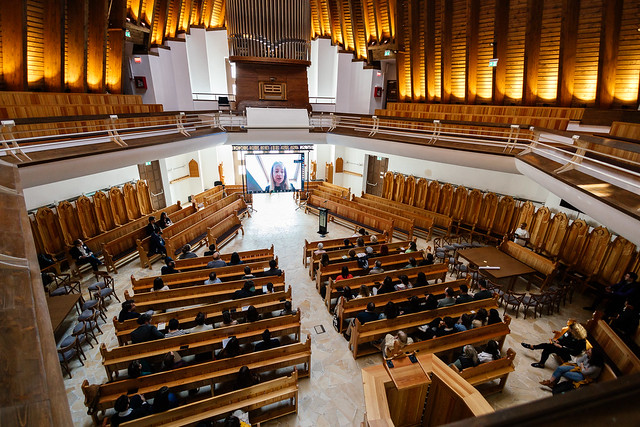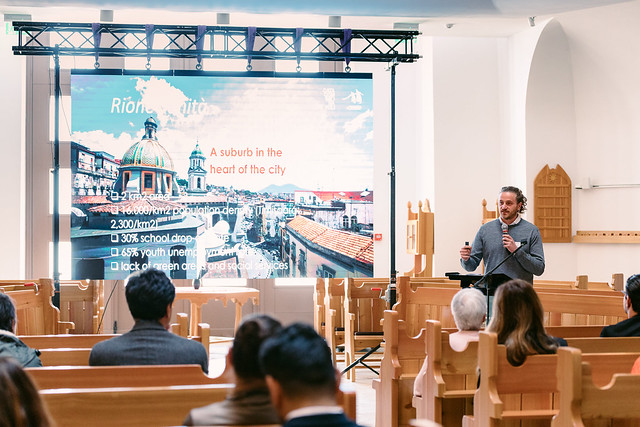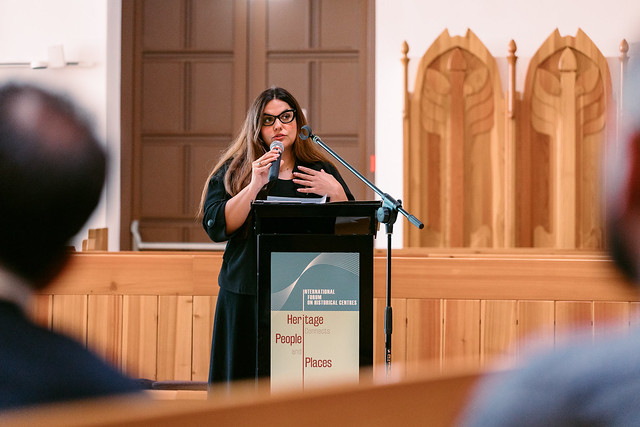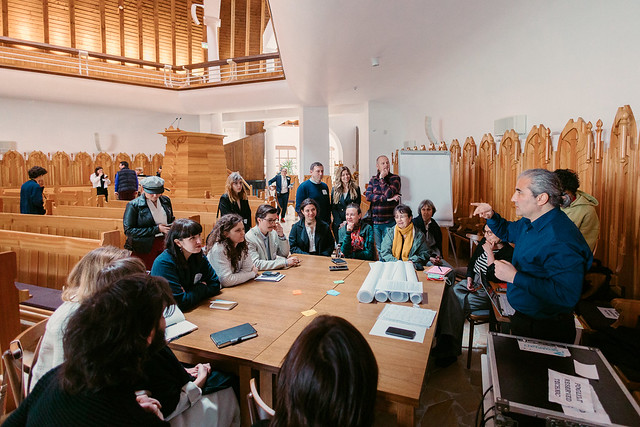Masterclass “Diversity and Inclusion in the Heritage Sector” held in Timișoara, Romania
The Masterclass “Diversity and Inclusion in the Heritage Sector” took place on 22 April in the impressive surroundings of the New Millennium Reformed Centre in Timișoara, Romania, a European Capital of Culture for 2023. The masterclass was organised by Europa Nostra, Romanian Order of Architects and Associata Prin Banat in the frame of the International Forum on Historic Centres. The masterclass was delivered through Europa Nostra’s network project European Cultural Heritage Agora, which has the support of the Creative Europe Programme of the European Union.
The full report of the Masterclass, including presentation summaries and further resources can be accessed here.
The Masterclass “Diversity and Inclusion in the Heritage Sector” offered participants insight into successful case studies and equipped them with the skills to better engage harder-to-reach audiences and to implement models of participatory governance for heritage. Case studies included the empowerment of women in the heritage field, the awareness-raising of Roma heritage, and urban regeneration through the recovery of heritage. Workshops allowed participants to delve into these themes at a deeper level.
The masterclass, which brought together diverse voices on a multifaceted topic, was moderated by Sara Crofts, Council Member of Europa Nostra and Chair of Europa Nostra UK.
In the first part of the session a range of speakers offered unique perspectives on how they approach building inclusive and participatory practices into their organisations’ work.
Pia Sopta, Policy Officer for Cultural Heritage Policies at the Directorate-General for Education and Culture of the European Commission, made the introductory remarks and framed inclusionary practices for heritage within policy developments in this area at the European Commission.
The first speaker was Volodymyr Kebalo (UA), Senior Project Officer for the Council of Europe project “Strengthening democratic resilience through civic participation during the war and in the post-war context in Ukraine”. His presentation focused on how to implement participatory urban public space planning and the co-creation of cities.
Hakan Shearer Demir (TR), Council of Europe Expert in Heritage Inclusion, presented on “Communities at the Heart of Heritage Governance”. He referenced the results of the Community-led Urban Strategies in Historic Towns (COMUS) programme, a Council of Europe and European Union joint programme that tested new revitalisation strategies in cities, and especially historic towns, in Armenia, Belarus, Georgia, Republic of Moldova and Ukraine, which invested in heritage resources as a matter of priority by integrating the protection and sustainable re-use of heritage with the planning of the built environment’s future as a dynamic asset towards progress. In his presentation, Hakan Shearer Demir stressed the importance of including communities at each phase of a process of heritage governance and presented successful examples of community governance from Viscri, Romania.
Coline Pélissier (FR), European Development Manager and PhD student at ACTA VISTA, offered a case study demonstrating how ACTA VISTA uses heritage as a lever for employment, training and social inclusion in Marseille. Each year, ACTA VISTA, together with BAO Formation and La Citadelle de Marseille, employs, trains and supports approximately 500 individuals, totalling 5,000 beneficiaries of all ages and backgrounds since its inception. These trainees face challenges in accessing employment and training opportunities and encounter various obstacles, including language, housing, mobility and health concerns. This innovative approach, which combines social support, training for vulnerable individuals, and a cultural dimension accessible to all. ACTA VISTA received a European Heritage Award / Europa Nostra Award 2023.
Tímea Junghaus (HU), Director of ERIAC – the European Roma Institute for Arts and Culture, explained how their organisation weaves Roma perspectives into European cultural heritage practices and demonstrated how Roma know-how and heritage can inform solutions to contemporary problems. This includes, for example, ways to live more sustainably in day-to-day life.
Eduardo Gargiulo (IT), Member of the Paranza Cooperative, described how their organisation drives social and urban regeneration through the involvement of the local community in the management of the Catacombe di Napoli, located in the Rione Sanita neighbourhood of Naples. The Paranza Cooperative’s interdisciplinary team has restored the frescoes and mosaics in the Catacombs and reopened the heritage sites to become one of the most popular tourist destinations in Italy. To date, 13,000 m2 of the Catacombs have been recovered, 44 jobs for young people created, and in 2019, 160,000 people visited the sites. Their work has completely inverted the perception of the neighbourhood, thus leading to its revitalisation. La Paranza Cooperative was awarded a European Heritage Award / Europa Nostra Award 2022.
Eugen Vaida (RO), Architect and Co-Founder of Asociata Monumentum, outlined how the Ambulance for Monuments initiative promotes gender equity through heritage. The Ambulance for Monuments has rescued hundreds of heritage-listed buildings in Romania through a large network of active heritage organisations. These emergency interventions are carried out by experts, students and trained craftsmen on a voluntary basis with the support of local communities and authorities. At the heart of the project in each region is an intervention kit and a lorry equipped with construction equipment and materials – the so-called ‘ambulance’. Through its activities, the initiative has brought together young women professionals and students with more conservative local communities from rural areas in Romania. The initiative brings women into construction activities that have long been considered the unique remit of male professionals and laymen, while respecting the traditional communities’ intangible heritage of customs and rituals. Ambulance for Monuments was presented with a European Heritage Award / Europa Nostra Award 2020.
After a short break, the masterclass participants split into groups to join one of the four workshops led by some of the speakers from the first session, as well as Alexandru Zamfir, Educational Expert from the Roma Education Fund, who hosted a workshop on how to include historical and cultural Roma elements in the Romanian educational curricula.
Part of the event is a series of workshops addressing the ‘how to’ of inclusion in heritage, including topics on #genderequity, urban regeneration and participatory governance through heritage. pic.twitter.com/P4iEKOSBh8
— Europa Nostra (@europanostra) April 22, 2023
The workshops provided a chance to learn more about the projects, but more importantly, offered the opportunity for delegates to engage with the topic and to start asking questions of themselves and each other. Each of the workshop groups entered into a lively dialogue with people offering honest reflections and seeking to challenge their own preconceptions and biases. There was even the opportunity for interactive engagement, for example, Hakan Shearer Demir, an expert in inclusive heritage governance in community regeneration projects, asked workshop participants to role-play the arguments raised by long-term residents versus newcomers in places where ‘local’ is being redefined. By asking people to place themselves in the shoes of a range of stakeholders, the session highlighted the tensions and contradictions that can arise in regeneration projects and reminded everyone of the need for broad and inclusive conversations where everyone’s voice can be heard.
Toward the end of the morning, the participants reconvened for the closing remarks. As the conversations spilled out into the courtyard over an al fresco shared lunch it was clear that there was a willingness to engage and to take those important steps on the path towards a more inclusive cultural heritage community that embraces and celebrates diversity – in all its forms.
The afternoon has been dedicated to Historical Centres – how do we strike a balance between living comfort and the preservation of our built heritage? pic.twitter.com/k1I3sfrPWQ
— Europa Nostra (@europanostra) April 22, 2023
The afternoon session of the International Forum on Historic Centres was dedicated to contemporary issues facing built heritage in historic town centres. The forum was part of the official programme of the European Capital of Culture 2023.










